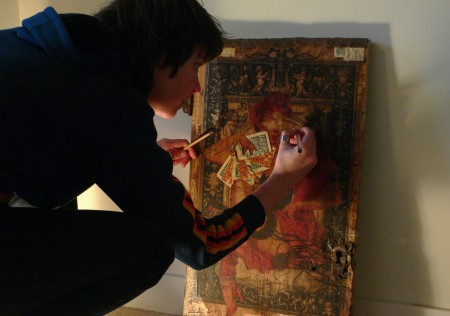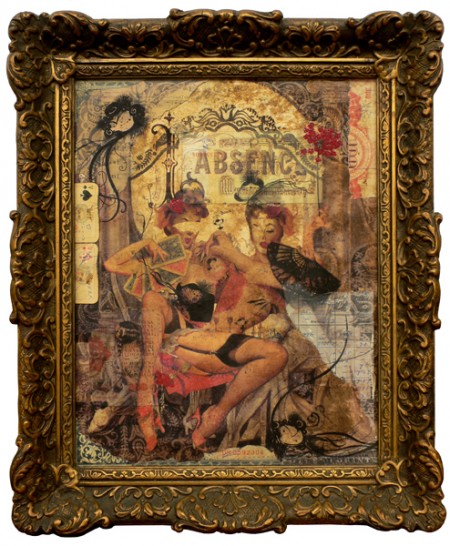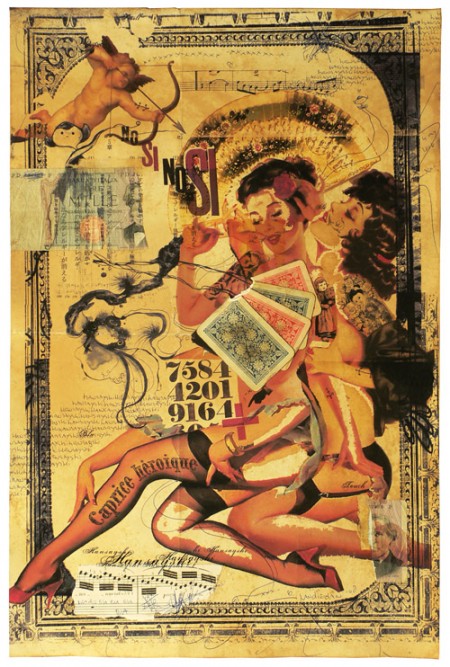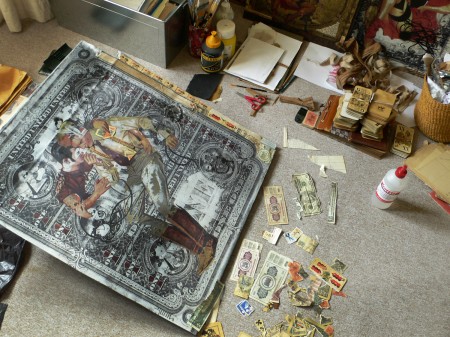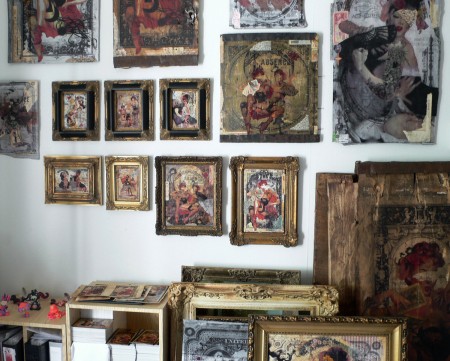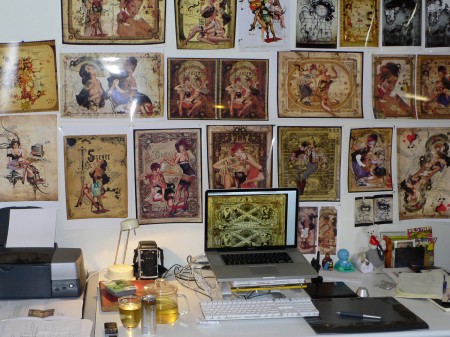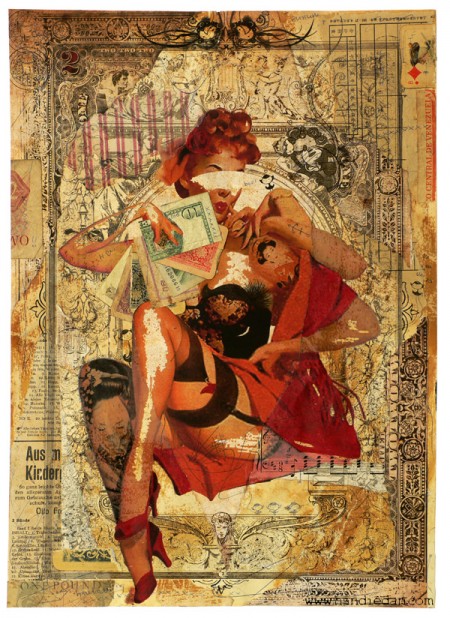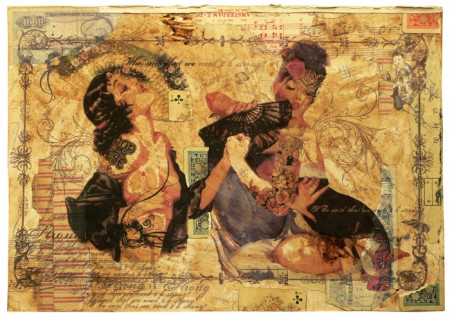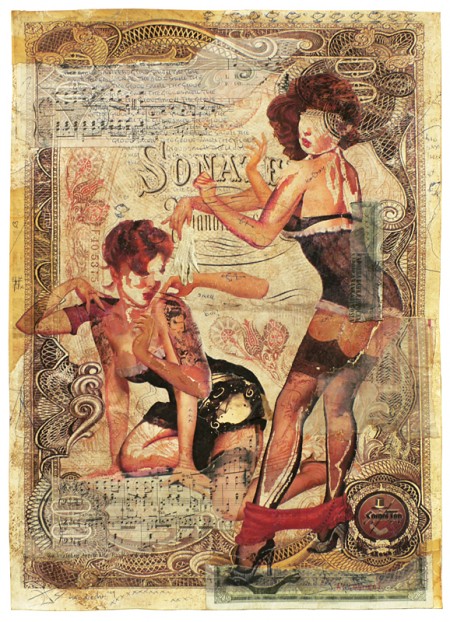In a letter written in 1906 to poet Alexander Blok, renowned Russian novelist Andrey Bely remarked on Paris’ red-light district destination Moulin Rouge: “Naked feet, and thighs, and arms, and breasts were being flung on me from bloody-red foam of translucent clothes.. In front of my nose a stream of bowler hats and black veils was still pulsing, foamy with bluish green and warm orange of feathers worn by the night beauties.” His description of the infamous “Red Mill” strikes one as much more scintillating than anything the Post-Impressionist Henri de Toulouse-Lautrec could have ever painted, but it’s this description that conjures the imagery of 29 year old Dutch artist Handiedan.
Through her collages, Handiedan rends, creates, and re-renders sensual depictions of chorus line and cabaret girls harkening back to an era of Victorian anterooms and seedy underground opium dens. AM recently sat down with the artist for a quick chat on her inspirations, her process and her thoughts on sexuality and art in this exclusive interview.
Read more after the jump.
Arrested Motion (AM): First off Handiedan, would you mind telling our readers a bit about yourself, who you are, where you come from and what you do?
Handiedan: Hello, I am a 29 year old woman from the Netherlands. Born in a tiny town in the south part. Check out ‘”prang – Capelle, Netherlands” on Google Map, its fun!
I studied Photographic Design at the Academy of Arts and Design and graduated in 2002. Now I have lived for about three years in Amsterdam and work here as an artist and designer under the name Handiedan.
AM: The name “Handiedan”, where does it come from? What does it mean?
Han = my name, the short version of my first name
die = that
dan = than
In English I know it’s a little confusing. People often think I am a guy, because they read ‘Handy Dan’ or something, but in Dutch it is actually a funny little rhyme.
A little history: When I write my email conversations or text messages I often end my messages with this kind of rhyme words and Dutch word combinations. ‘Cheers van han dan’, (Cheers from Han than), ‘xx van han die dan!’ and ‘Han says hi!’
AM : Your work, for me, seems to draw much inspiration from Victorian NeoClassicism, can you tell us about your relationship to your art and the origin of your unique and distinctive style?
Handiedan: I always nourish the fascination for details and structures of old materials and objects. When I was young, I collected all kinds of small stuff on my window casing and night table so I always could see them – old small stones I gathered in the garden or the Belgium cave tourist shop, small metal or wooden toys, and old books or pictures from my grandparents.
My grandpa worked as a shoe designer in The Netherlands and Paris when he was younger. At the age of five till eight I was always drawing and I loved to join my grandpa in his pension hobby workshop at home. We worked together in his workshop in silence for hours – he behind his desk, making handmade wooden model ships and pen drawings and me, while I was sitting and drawing on the floor and wondering about the finest details and the patience my grandpa worked with. I liked this so much and felt I wanted to do that too.
The last years I developed my fascination for the old ages and their paintings. Over here we have the Dutch design with its Less is more” theory. But with the old age paintings, it never can be enough details, second layers, iconic figures, elegance and drama.
The line drawings you can find back in the collages are the ones I made when I don’t think about anything. They have no subject and there is no concept. I just draw and the lines are flowing their own way. Sometimes, I even draw left handed to make it more impulsive and unexpected.
AM: As a collage artist you employ many mediums and various sourced objects. I’ve noticed a fair amount of vintage sheet music and currency in the background of your works. What other types of materials do you use? How do you find them, and what’s the most unusual element you’ve acquired for a piece?
Handiedan: I gather the vintage stuff on the street, in old buildings, old boxes in the attic, at flea markets, browsing the internet, traveling countries, using personal stuff, and people even send me old money to use in my OG’s, which is great. I love this interaction!
In my artworks, you’ll also find Chinese post papers or papers from cook books, all kinds of stamps, old fabrics from old chests, old rusty nails, cigar bands, my grandma’s old bridge book, play cards, dried flowers, Spanish fans and of course the vintage pin-up ladies and old movie posters.
But the most unusual elements I used are my visa from my old passport and my dad’s old incomplete cigar band collection. I used it on the wooden “2Faces” as the structure of the fan. I never told him about this.
AM: Can you tell us what a Day in the Life of Handiedan is like?
Handiedan: Some regular morning stuff: I stand up, give my love and my cat a kiss and a hug and do all the cat cleaning and giving foot stuff, drink a coffee and eat my breakfast while I check my emails and what’s going on online. After I finished my emails, I am ready to work on my artworks or designs.
Some regular stuff for the afternoon: Gather old stuff at online market places, go outside to check my PO Box, old flea markets, recycle companies and my printer, doing a coffee and a chat with some freelance friends in their studio, surf the internet to see whats going on again, design on my computer, wash old papers, doing some doodles, scan all the stuff and create new collages sitting on the floor of my workplace with glue, paint, scissors and a lot of collected materials.
AM: Does a computer play into your process? If so, how?
Handiedan: Yes, it does! I use the computer to put all the collected stuff together and to create the main and basis design. Before I start designing I usually only know the atmosphere the artwork must have or I pick a fictive subject to have a starting point, but I don’t know exactly what or how it will look like as a final result. The computer gives me the opportunity to play around and experiment with all the different ornaments before I put them in place.
I first set out the texture I am going to work on. By playing around with different body parts I create the main character or center piece. Generally, once I get done with the main piece, I start putting things around it just to see what elements work well with each other and when they find their place I will leave them there and start adding new ornaments to it and finish it with digital doodling.
When I am totally happy with the digital design I have the basis for my originals. I rip the design apart, delete a lot of elements and keep the main and center parts to use them as the basis for printing on wood, zinc and collages on paper. After printing I redevelop the design all over again and add small differences and extras with the gathered old materials, glue, paint and pen.
AM: In addition to your collage work, you also have a rather impressive photography portfolio. What role does photography play for you and does it influence or inspire your mixed media works?
Handiedan: I have always drawn since I was young and it was great for me to learn all these different techniques and media. They gave me the availability to create in a wider perspective. During my study, I start editing on the computer, manipulate in the darkroom, experiment with chemicals and drawn elements on the photographic paper. It was one big personal experiment on how photographic images and drawings can interact together.
I also learned to watch through a specific photographic framework. You can find back my fashion photographic point of view in the fashionable way the pin-up ladies and men are positioned in the surrounding.
AM: I noticed in your “NYC” photoset a couple nice shots of some street art, pieces by Invader and Skullphone specifically. Are you a fan of these artists, or of street art in general?
Handiedan: I am a fan of street art in general and I like the little hidden creatures the most. The ones you only see by chance. The fascinating structures of the old buildings in daily life in combination of the world of strange and hidden characters. It is fun to explore them while I am strolling through a strange big city.
AM: William Adolphe Bouguereau, Aubrey Beardsley and Robert McGinnis are three artists that I feel can be drawn upon for parallels to your work. Would you agree? What artists do inspire you, or do you follow?
Handiedan: It’s hard to name specific artists. I get inspired by different time periods and art from different cultures. France, Spain and Italy with it’s Catholicism paintings, China and Japan with the traditional, and today’s pen paintings, types, gardens and the old manga cartoons, classic artists like Michaelangelo and M.C Escher, American poster art, today’s character design and toys, India with it’s colors and Bollywood…
So I focus more on the covering trends of the period, but sometimes an artist – known or unknown – gets my real attention because for me, they represent and summarize this trend or art period. And these days, art, time, and influences are changing so quickly. Every year, I have some new artists I get inspired by.
AM: Alan Moore once said: “Sexually progressive cultures gave us literature, philosophy, civilization and the rest, while sexually restrictive cultures gave us the Dark Ages and the Holocaust.” What are you thoughts on that?
Handiedan: I think it’s a pity that sexuality stays a sort of an issue and taboo in all times. The constant discussion of what is normal and matching it with the daily standards and values. Sexuality and humanity are two things which cannot go without each other and sexual expressions are everywhere, even if you are aware of it or not. Not being balanced in all different ways results in bad things I guess. And expression helps with finding balance, for the mind and the body.
AM: As a female artist in the typically male-artist-dominated world of erotic art, do you feel your art touches upon subjects and issues not typically found or addressed?
Handiedan: Male and female are different, so when I touch as a female artist the same subject as a male artist does, it automatically result in a different kind of image language.
I touch the beauty and sex of women – and in my latest work men too – through the eye of a woman and try to combine it with the eye and feelings of a man. I try to reach the tension of both sexes and mix everything up a little. Through sensitive touched borders and with recognizable imagery, I want to touch below the surface of daily life, sexuality and intimacy represented in an image.
AM: You started off 2010 pretty correct with a sold out show, “Translucent Skin” in January, what are your plans for the rest of the year?
At the moment, I am preparing together with Phone Booth Gallery a new screen print which will be released in February or March.
I also will join some group shows with my pin-up artwork. One piece goes to “The Dirty Show” in Detroit in February and later in Chicago, I will join a pop up gallery group show with Art Asylum Boston. Also working with Ficomic and Actar in Barcelona in May. Later this year, a solo with Phone Booth Gallery and hopefully one to end with in New York. But more information about this later. A lot of exciting stuff is coming up, yeah!
AM: Any words of wisdom for our readers?
Like a good friend of me always said: “Love what you do and do what you love!”



